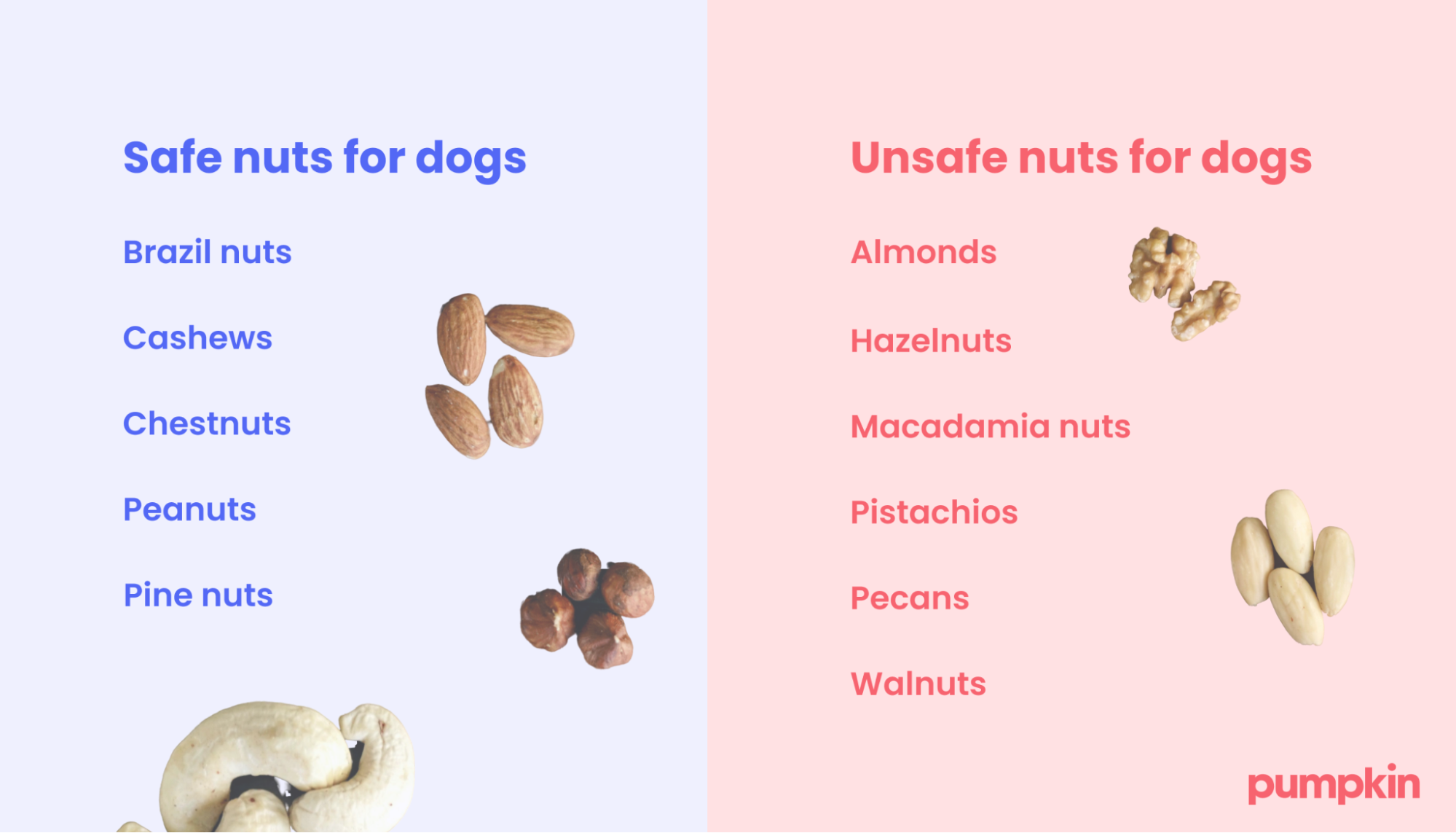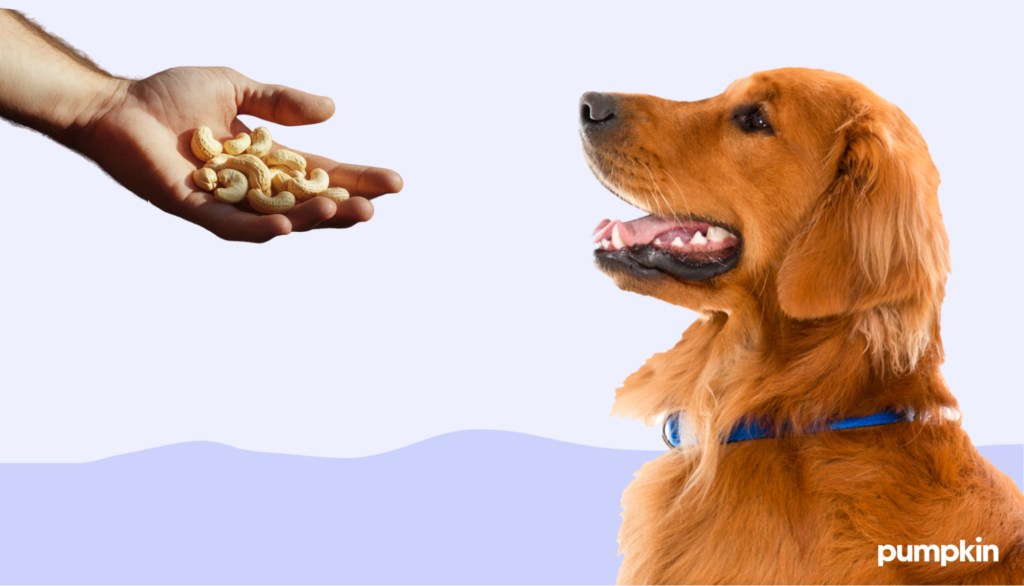Key Points
- Dogs can eat some nuts in small amounts, but not all nuts are safe for dogs.
- Dogs should only eat nuts in small quantities because they are high in fat and calories.
- Avoid feeding your dog flavored or salted nuts, peanut butter with xylitol, or trail mixes with chocolate.
As a pet parent, you’d give your dogs the world if you could, and sometimes that means giving them the last cashew from your snack bag.
But when it comes to dogs and nuts, sharing the love gets a bit more complicated. So, can dogs eat nuts? While some nuts are perfectly safe and healthy for dogs, others are a big no-no.
Before you toss your dog a peanut or almond, let’s sort out the safe nuts from the risky ones.
Which nuts are safe? A cheat sheet
Need a quick verdict on whether that cashew your pup just gobbled up is going to hurt them? Refer to this quick guide before diving into all the nutty details.
Dog-safe nuts include:
- Peanuts
- Brazil nuts
- Cashews
- Chestnuts
- Peanuts
- Pine nuts
The following nuts are definitely not safe for dogs:
- Almonds
- Hazelnuts
- Hickory nuts
- Horse Chestnuts
- Macadamia nuts
- Pecans
- Pistachios
- Walnuts
Safe nuts for dogs: A closer look
Many nuts are safe for dogs. If your pup snags one or two nuts on the sly, it likely won’t cause a problem. But keep in mind that nuts are generally high in fat and calories. Overdoing it can cause weight gain and gastrointestinal problems for your dog.
Steer clear of salted or seasoned nuts, and always remove nut shells — they’re choking hazards waiting to happen.
If you’re unsure about a particular nut, a quick check-in with your vet can help you determine safe and appropriate portion sizes for your pup.

Peanuts
Most dog parents think about peanuts first when considering a nutty treat for their pup. After all, what dog doesn’t salivate over peanut butter?
Peanuts, which are actually legumes, are safe for your furry friend. They’re packed with protein, vitamins E and B, and minerals like magnesium and potassium.
While peanut butter is usually a safe and delicious treat for your dog, stay away from any that include the sugar substitute xylitol, which is highly toxic for pups.
Roasted cashews
Cashews are safest for dogs when roasted. Raw cashews, though technically safe, could cause a toxic reaction in your dog because they contain urushiol, a toxin found in poison ivy.
Cashews are a good source of magnesium, copper, and antioxidants like zinc and selenium that protect cells from damage. But these crunchy treats also contain high amounts of fat, calories, and potassium, which can spell trouble for dogs prone to urinary tract problems. So, it’s best to offer them sparingly as an occasional treat for your good boy or girl.
Roasted chestnuts
The American chestnut is a safe nut to offer your dog when roasted — but beware of its European cousin, the horse chestnut, which is toxic to dogs.
While they’re filled with healthy goodness like vitamin C and fiber, American chestnuts are very large and can present choking hazards. You should only give your dogs small portions of roasted chestnuts if you’re sharing. This nut may be a healthier choice for overweight or pancreatitis-prone dogs, as it’s lower in fat.
Brazil nuts
These large nuts are safe for your dog and rich in selenium, magnesium, and phosphorus. However, they’re the fattiest of the nuts.
Eating one Brazil nut may not affect your large dog, but offering more could cause stomach upset or the more serious issue of pancreatitis. For a small dog, eating even one Brazil nut could risk choking or intestinal blockage.
Regardless of their size, make sure your pup doesn’t gulp up this tasty treat too quickly, or serve them smaller pieces of Brazil nuts.
Pine nuts
Pine nuts are safe for your dog, offering valuable nutrients like iron, manganese, and vitamin K. In fact, an ounce of pine nuts contains 15 micrograms of vitamin K, which helps your dog’s blood clot properly.
They may be tiny, but pine nuts are high in fats and phosphorus. Don’t go overboard when sharing these nutritious little nuggets with your pup.
More about unsafe nuts for dogs
What about nuts that are off-limits to your pup? Never, ever feed your dog any of these:
- Almonds: Can cause digestive issues, like vomiting and diarrhea. Flavored almonds can lead to water retention and salt toxicity.
- Walnuts: Contain tremorgenic mycotoxins, which could cause gastrointestinal issues and neurological problems. Black walnuts are extremely toxic to dogs.
- Pecans: Also contain tremorgenic mycotoxins found in mold, which can cause tremors and seizures.
- Pistachios: Are very high in fat and salt, which can lead to gastrointestinal issues and pancreatitis. They also contain the toxin urushiol.
- Hazelnuts: Contain mycotoxins and juglone (on the shell), making them dangerous to dogs.
- Horse chestnuts: All parts of the horse chestnut (leaves, bark, seeds) are extremely toxic to dogs because they contain saponin. Poisoning symptoms include vomiting and diarrhea, and in severe cases convulsions and coma.
- Macadamia nuts: Even small amounts of these nuts can cause weakness, tremors, ataxia, vomiting, and hyperthermia in your dog within 12 hours.
- Hickory nuts: Can also cause gastrointestinal problems and intestinal blockage.
If your dog accidentally ingests any of these nuts, watch for signs of diarrhea, vomiting, lethargy, or weakness. However, don’t try to make your dog throw up!
Instead, contact your veterinarian or the ASPCA Animal Poison Control Center at 1-888-426-4435. You can also prepare for unexpected emergencies in the future by getting dog insurance to protect your pup and your finances.
Tips for safely feeding your dog nuts
Even when feeding your pup nuts on the “safe” list, it’s important to keep some best practices in mind:
Limit portion sizes
Nuts are a high-fat and high-calorie food, which could spell trouble for your pooch — and may even put them at risk of developing obesity down the line.

Sharing too many nuts from your mixed-nut snack bowl could cause your pup to have a terrible tummy ache. In extreme cases, it could even cause pancreatitis, an inflammation of the pancreas that results from an overload of fats in your dog’s diet. Contact your vet right away if you suspect your dog has acute pancreatitis.
Remember, when introducing your dog to nuts, only offer a few at a time, and observe them before you offer seconds. It’s always better to be safe than sorry.
Look out for mold and fungus
All nuts run the risk of containing mold or fungus that can be toxic to your dog if ingested. This is especially true of raw nuts, so only offer your dog roasted or boiled nuts to be safe. These molds, known as mycotoxins, can cause neurological issues, tremors, and even death in dogs.
Molds can also be present on old nuts — so that bag of nuts hiding in the back of your pantry is better thrown in the trash than offered as a treat for your dog. Store your nuts in a cool, dry place to prevent mold from growing, and throw away any nuts that are discolored or taste off.
Skip the seasonings
Many nuts are sprinkled with salts, spices, and sweeteners. These aren’t good nutritional options for your pooch. Since dogs can’t process seasonings or salts, ingesting too much could cause salt toxicity or a bad tummy ache.
Spices and sweeteners can also irritate a dog’s digestive system. So, avoid any flavored nuts that have garlic, onion powder, and chili powder. Honey-roasted nuts can also lead to a stomach ache. Stick to plain, unsalted nuts for a safe snack.
Avoid nutshells
Regardless of the type of nut, eating nutshells (or feeding them to your dog) is never a good idea. They aren’t digestible, and they could block your dog’s airway or digestive tract if swallowed. Their sharp edges may also puncture your dog’s intestinal tract, causing internal bleeding, infections, and emergency surgery.
If your pup loves to chomp on anything they can get their paws on, those hard nutshells can chip or fracture their teeth.
Other safe foods for dogs
Rather than offering them something that may carry a risk to their health, try these safe, healthy snacks for your dog:
- Apples
- Bananas
- Blueberries
- Carrots
- Broccoli
- Green beans
- Pumpkin
- Plain yogurt
- Cooked eggs
In a nutshell: While some nuts are on the menu for dogs, others are best left untouched. But even with the safe nuts, moderation is key. Too many nuts can turn a healthy snack into a not-so-healthy situation, so be a savvy snacker, choose wisely, and keep those portions small!
Can dogs eat nuts? FAQ
- https://fdc.nal.usda.gov/fdc-app.html#/food-details/2515376/nutrients
- https://www.fda.gov/consumers/consumer-updates/paws-xylitol-its-dangerous-dogs
- https://www.scientificamerican.com/article/what-do-cashews-mangoes-and-poison-ivy-have-in-common/
- https://fdc.nal.usda.gov/fdc-app.html#/food-details/170162/nutrients
- https://fdc.nal.usda.gov/fdc-app.html#/food-details/170168/nutrients
- https://fdc.nal.usda.gov/fdc-app.html#/food-details/170569/nutrients
- https://fdc.nal.usda.gov/fdc-app.html#/food-details/2346392/nutrients
- https://ods.od.nih.gov/factsheets/VitaminK-HealthProfessional/#h14
- https://www.petpoisonhelpline.com/poison/salt/
- https://pubmed.ncbi.nlm.nih.gov/39173649/
- https://www.thesprucepets.com/can-dogs-eat-pecans-4844512
- https://www.akc.org/expert-advice/nutrition/can-dogs-eat-pistachios/
- https://vetcbdhemp.com/can-dogs-eat-hazelnuts/?srsltid=AfmBOoq9vDYV85DOYXr2wi6kmIBlCkoHRngTbMGO_gG3QPv1eihZFbq9
- https://www.akc.org/expert-advice/home-living/poisonous-plants-for-dogs/
- https://www.msdvetmanual.com/toxicology/food-hazards/macadamia-nut-toxicosis-in-dogs
- https://www.fda.gov/consumers/consumer-updates/paws-xylitol-its-dangerous-dogs




